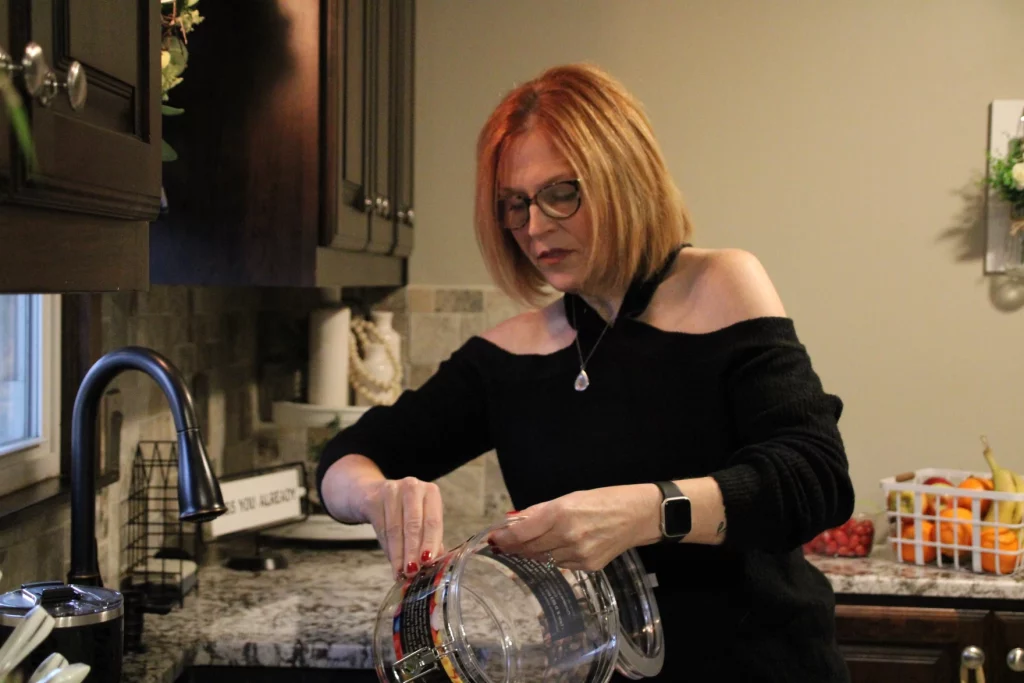It’s been over two years since Barry Guyer came down with COVID-19.
“(I) was just out in the harvest field. I just got feeling terrible,” said Guyer, who farms near Goodland in northwest Kansas. “I got home that one night I said, ‘I think I’ve got this stuff.’”
Guyer was admitted into the hospital for a week. It would be about a month before he was back out on the farm. It took nine months for his sense of taste and smell to come back. He’s still waiting for his stamina to return.
“I’m climbing grain bins and moving augers and stuff around today by myself here,” he said. “It just takes all your breath away doing all that and then you just have to stop and wait for a little bit to get caught back up.”
Long COVID, the often-baffling aftereffects that trouble the body for months or years after acute symptoms pass, likely haunts close to 200,000 people in Kansas. But Kansas is one of just two states without a medical center specializing in treatment of the condition.
That leaves people like Guyer hours away from specialists with the expertise to battle the brain fog and breathing ailments that stay after the COVID wanes. And even people who live close to Kansas City and places in neighboring states with teams of specialists can wait months for an appointment.
The clinics formed across the country, typically in hospitals. They combine a range of expertise for treating long COVID. But they’re clustered, predictably, in urban areas. And though nearly every state has at least one, Kansas and South Dakota have none.
The right specialists
While hospitals and medical centers might have pulmonologists or cardiologists to treat long-COVID symptoms, the special centers designed to treat it can give patients more comprehensive care.
“A specialized center can take a comprehensive and kind of 50,000-foot view of the patient,” said Dr. William Michael Brode, who works in a long COVID clinic at the Dell Medical School in Texas. “So you’re not kind of wandering doctor to doctor.”
Survivor Corps, an organization that tries to help people with long COVID, says there are about 240 centers scattered across the country focused on long COVID. Most of them are listed as long-term recovery centers.
“Those places aim to be kind of one-stop shops where you can go and get treatment from multiple specialists,” said Survivor Corps spokeswoman Kathryn Burke.
Long drives, longer waits
The wait time can stretch out for months. Yet Brode said people appear willing to wait and travel for the specialized help.
“We have patients coming from the (U.S.-Mexico) border who have traveled five hours to come see us,” said Brode. “I think eight hours is our record, which shows that people are seeking out this care and willing to put in the time to get the care they need.”
For someone like Guyer, the closest one-stop clinic would be in Denver — roughly a three-hour drive. Burke said local clinics and hospitals typically can’t afford to set up their own long COVID clinics.
“It is hard for people in more rural locations, less wealthy locations, to be able to access long COVID care simply because … the medical clinics and medical centers around them simply may not have the funding or the staffing to dedicate time and money towards long COVID clinics,” Burke said.
She would like to see more federal funding to help more rural hospitals offer long COVID clinics.
“The federal government stepping in and having those clinics and centers established in more rural regions,” Burke said, “is really crucial.”
But even in urban areas with long COVID clinics, wait times can be maddening.
Kansas had a virtual long COVID clinic during the height of the pandemic. The University of Kansas Health System in Kansas City, Kansas, opened the online clinic to existing KU patients at the beginning of 2021 and then opened it up to the public a few months later.
Debbie Hamilton was referred to KU’s long COVID clinic, but she was told she would have to wait three months after having COVID for an appointment.
“I had such high hopes and … just felt like I had literally taken a beating whenever they told me that,” she said.
Hamilton had COVID in 2021 and never fully recovered. She described her cognitive issues that made it difficult to drive, take a shower and be in a room with other people including her own family. Dealing with her symptoms and having to constantly advocate for her medical treatment took a mental toll.
“It’s awful,” she said. “Feeling like failure; feeling like you can’t function; feeling … not even smart anymore. Feeling like the doctors just think that you’re crazy.”
Even though she’s a nurse, Hamilton struggled to navigate through doctors and appointments. One doctor told her that they “didn’t do COVID.”
“Why is that an option to say?” Hamilton said. “These patients are having so many more things. It’s causing autoimmune problems. It’s causing heart problems. It’s causing breathing problems.”
It took about a year for Hamilton to recover enough to return to work. She believes the clinic also is a way to just acknowledge that long COVID is real and to give people a place to feel validated.
“There needs to be a clinic, because I think it’s very much more widespread than anybody thinks,” Hamilton said.
Limited awareness
While Kansas has no long COVID clinics, Missouri has five. Two in Kansas City, two in St. Louis, and one in Columbia.
Dr. Zachary Holliday works at the Missouri University Health Care’s Columbia clinic. In one room, a bike and treadmill sit nestled next to each other and close to a machine that patients blow into to test breathing capacity.
“It measures lung function and what that boils down to is how much air can someone get in and out and how fast,” he said.

The clinic is only open one Thursday a month. That limits how many people it can treat.
“We try to do our best to get folks in as fast as possible,” said Holliday. “And if they can’t see us in the long COVID clinic, what we’ve tried to do is actually get them still access to the pulmonary clinic.”
He said demand could be even greater because many people don’t even know about the clinic.
Guyer, the northwest Kansas farmer dealing with long COVID, only recently learned such clinics exist with expertise to treat his problems. He said he would consider driving to Denver — to the closest long COVID clinic — if he could time it with other appointments. At the same time, he’s become resigned to his damaged health.
“I don’t think that’s ever going to change,” said Guyer. “I think it’s just gonna be a part of life like I have to deal with now.”
Samantha Horton reports on health for the Kansas News Service. You can follow her on Twitter @SamHorton5.
The Kansas News Service is a collaboration of KCUR, Kansas Public Radio, KMUW, and High Plains Public Radio focused on health, the social determinants of health and their connection to public policy.
Kansas News Service stories and photos may be republished by news media at no cost with proper attribution and a link to ksnewsservice.org.













